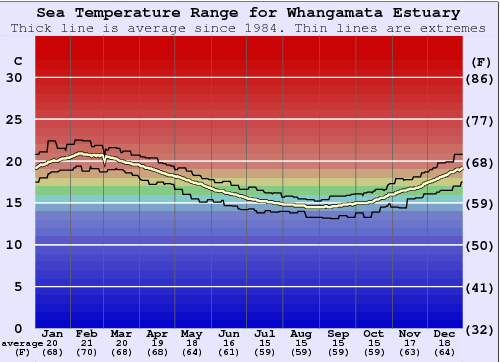Whangamata Estuary Water Temperature and Wetsuit Guide
(The Coromandel, New Zealand)
- Forecast
- Maps
- Live
- Weather State
- Spot Information
Today's Whangamata Estuary sea temperature is 71 °F
(Which is 4.0°F warmer than normal for this time of year)
| Mean: | 67 °F | ||||||||||||||||||||||||||||||||||||||||||||||||||||||||||||||||||||||||||||||||||||||||||||||||||
|---|---|---|---|---|---|---|---|---|---|---|---|---|---|---|---|---|---|---|---|---|---|---|---|---|---|---|---|---|---|---|---|---|---|---|---|---|---|---|---|---|---|---|---|---|---|---|---|---|---|---|---|---|---|---|---|---|---|---|---|---|---|---|---|---|---|---|---|---|---|---|---|---|---|---|---|---|---|---|---|---|---|---|---|---|---|---|---|---|---|---|---|---|---|---|---|---|---|---|---|
| Range: | 64 °F to 69 °F | ||||||||||||||||||||||||||||||||||||||||||||||||||||||||||||||||||||||||||||||||||||||||||||||||||
| Statistics for 04 Apr (1981–2005) | |||||||||||||||||||||||||||||||||||||||||||||||||||||||||||||||||||||||||||||||||||||||||||||||||||
Today, many surfers would wear a shorty .
Warm in and out of the water temperature at Whangamata Estuary today, but forecast to be overcast. With sea temperatures of 70 °F and a wind chill of 68 °F, most surfers will choose a shorty or a summer suit or just board shorts.
(click thumbnails to expand)
Below is a graph of Historical Sea Surface Temperature for Whangamata Estuary. This has been derived from analysis of two decades of oceanographic satellite measurements of nearby open water. We have calculated the average water temperature variation around the year as well as the extremes that have been observed on each date.

All of the graphs for the surf breaks presented on Surf-Forecast.com are on the same scale to enable comparison between locations around the world.
Whangamata Estuary water temperatures peak in the range 19 to 22°C (66 to 72°F) on around the 7th of February and are at their lowest on about the 20th of August, in the range 13 to 15°C (55 to 59°F). Whangamata Estuary water temperatures are highest in the first part of February. Surfers should use a 2mm long sleeve shorty or a 3/2mm spring wetsuit if the wind is up. The lowest water temperatures at Whangamata Estuary in mid to late August are ideally suited to a 4/3mm wetsuit + 3mm boots, although a 5/3mm wetsuit may be preferable for longer sessions and cold windy days.
Actual sea surface water temperatures close to shore at Whangamata Estuary can vary by several degrees compared with these open water averages. This is especially true after heavy rain, close to river mouths or after long periods of strong offshore winds. Offshore winds cause colder deep water to replace surface water that has been warmed by the sun. Air temperature, wind-chill and sunshine should also be considered before deciding on the kind of wetsuit needed to stay warm when surfing at Whangamata Estuary. Refer to our detailed weather forecasts for this information.












 Nearest
Nearest